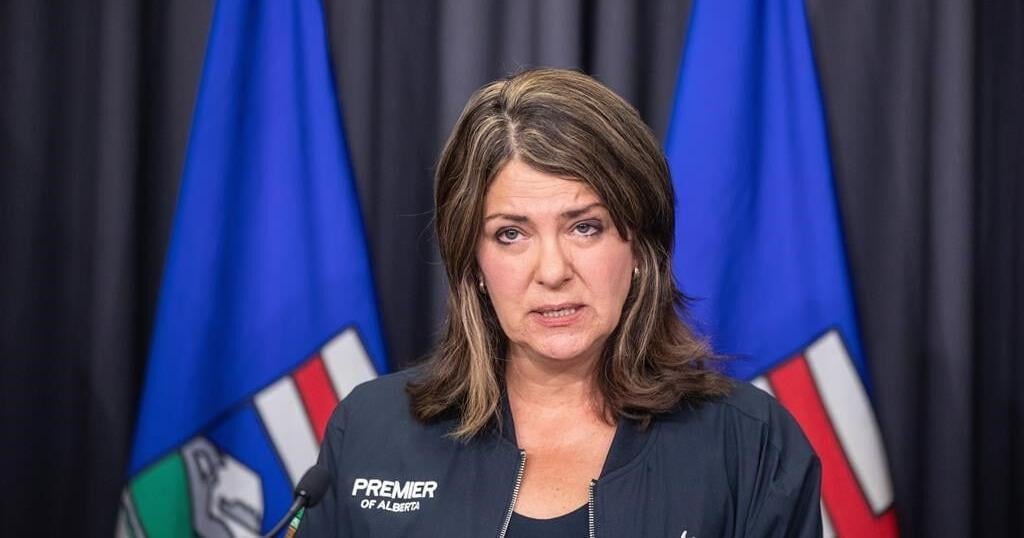EDMONTON – Premier Danielle Smith says she plans to reinforce the right to decide whether to receive a vaccination or other medical treatment in changes to the Alberta Bill of Rights.
In an online video posted Tuesday, Smith said her government is to soon introduce legislation amending the document to ensure the right to make informed medical decisions without fear of undue government pressure or interference. The legislature reconvenes in late October.
“It is my firm conviction that no Albertan should ever be subjected (to) or pressured into accepting a medical treatment without their full consent,” she said.
The Alberta Bill of Rights only applies to matters under provincial authority.
Smith, speaking to right-wing online media outlet The Western Standard, said Tuesday she hopes if Alberta shows it “is not going to just go along with whatever edicts the federal government brings down,” Ottawa “would be a lot more judicious in coming through with any type of policy like (vaccine mandates) again.”
University of Calgary law professor Lorian Hardcastle said it’s hard to know the impacts without seeing the amending legislation itself.
“I would say that it’s worrisome,” she said. “And we’re less well prepared if we were to potentially go into another pandemic.”
Hardcastle said the Alberta government already stripped itself of the authority to impose mandatory vaccinations during a public health emergency when it made changes to the Public Health Act during the COVID-19 pandemic.
It’s unclear if employers could be prohibited from requiring employees to receive certain vaccinations, she added.
“What tools will we be potentially taking out of the hands of employers that work with vulnerable people or the like in terms of not being able to effectively respond to a public health emergency, or even just the public health status quo?”
Smith told the Western Standard that Ottawa could still impose vaccination requirements for federal workers, but her government has authority over provincially regulated workplaces.
Hardcastle added the proposal would likely clash with the United Conservative government’s plan to introduce legislation giving police and family the authority to force drug users into treatment.
“Their new (addictions treatment) legislation could actually be subject to legal challenge under these changes to the Bill of Rights.”
Other changes to the Bill of Rights outlined by Smith Tuesday would also ensure the province respects “the right of individuals to legally acquire, keep and safely use firearms.”
Smith said she believes law-abiding gun owners have been targeted by the federal government, and she hopes the changes will better protect farmers, ranchers, hunters and sports enthusiasts.
The legislation would also declare that Albertans can’t be deprived of their property without due process of law and fair compensation, Smith said.
Eric Adams, a constitutional law professor at the University of Alberta, agreed it’s too soon to tell what impacts the proposed changes may have.
A draft version of a new Alberta Bill of Rights signed off on by the board of the United Conservative Party contains 21 rights, including the three Smith mentioned in her Tuesday video.
Adams said any new right put forward that goes beyond what is already covered by the Charter of Rights and Freedoms would lead into “new legal terrain in Alberta”
“You’re articulating something fundamental about the province, about its judicial system, about the power of courts and about limits that are being imposed on governments,” he said.
Adams added such an important change to Alberta’s legal landscape should be subject to a “robust” engagement process that would determine the potential ramifications of each new right, especially during public health and safety emergencies.
“All of those questions and concerns I would think would want to be fully debated at a public level if the government is bringing forward extensive changes to the constitution of Alberta.”
Smith swept into her leadership promising to address COVID-19 grievances, fired key public health officials who served during the pandemic soon after taking office and is now working to dismantle and replace the provincial health authority.
United Conservative Party members have been pushing Smith for the recognition of rights that go well beyond the Canadian Constitution and the Charter of Rights and Freedoms, including around guns, parental rights and taxes.
Smith’s announcement comes as she faces a party leadership review in early November.
Alberta conservatives have been known to boot their own leaders from the top job, including former UCP premier Jason Kenney who stepped down after winning tepid support in a leadership review.
This report by The Canadian Press was first published on Sept. 24, 2024.
